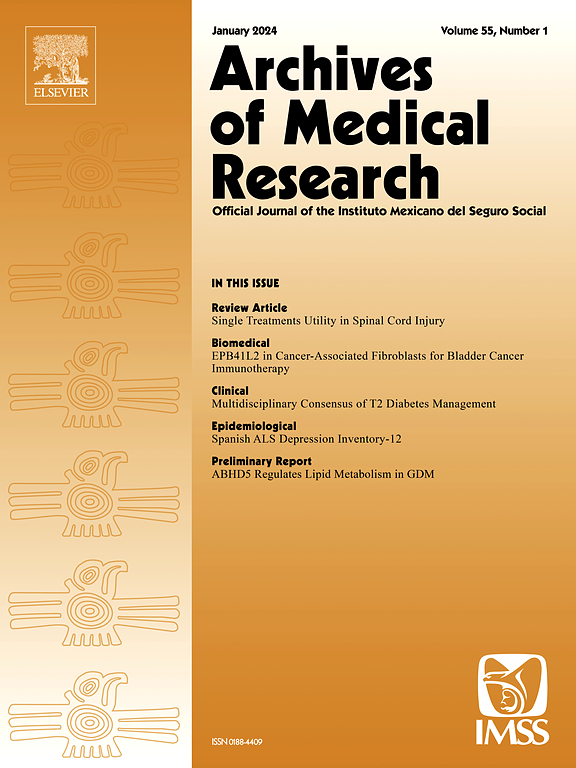墨西哥人群的始祖变异:系统回顾
IF 3.4
3区 医学
Q1 MEDICINE, RESEARCH & EXPERIMENTAL
引用次数: 0
摘要
始祖变异(FVs)是遗传自共同祖先的基因改变,在基因同质的群体中经常观察到。FVs显著影响特定人群中遗传疾病的流行;然而,这些变异从未在墨西哥人群中得到全面描述。目的本系统综述旨在总结和描述墨西哥源性FVs及其与特定健康状况的关系。方法使用预设的检索字符串从LILACS、COCHRANE、Scopus和PubMed数据库中检索研究。从文章中提取符合纳入标准的基因、变异和单倍型信息。根据所提供的证据,根据是否有强或弱证据将源自墨西哥人群的变异分类为fv。结果共筛选到32篇研究,共描述了19个基因和21个FVs。这些变异包括与多种疾病相关的变异,如Stargardt病、乳腺癌和卵巢癌、范可尼贫血、先天性肌肉萎缩症和家族性高胆固醇血症。单倍型分析显示,一些变异虽然在墨西哥人群中很常见,但似乎来自欧洲,因为它们的单倍型与在欧洲人群中发现的变异相匹配,可能代表了16世纪初西班牙征服墨西哥后引入墨西哥领土的变异。结论这些结果为墨西哥人群中存在的FVs提供了一个全面的视图,增加了我们对该地区遗传结构的理解。此外,它们提供了一个广泛的背景来阐明FVs与临床、历史和文化发现之间的潜在关联。本文章由计算机程序翻译,如有差异,请以英文原文为准。
Founder Variants in the Mexican Population: A Systematic Review
Background
Founder variants (FVs) are genetic alterations inherited from a common ancestor that are frequently observed in genetically homogeneous populations. FVs significantly influence the prevalence of genetic disorders in specific populations; however, these variants have never been comprehensively described for the Mexican population.
Aim
This systematic review aimed to summarize and describe FVs of Mexican origin and their association with specific health conditions.
Methods
Studies were retrieved from the LILACS, COCHRANE, Scopus, and PubMed databases using a pre-specified search string. Information on genes, variants, and haplotypes that met the inclusion criteria was extracted from the articles. Based on the evidence provided, variants originating in the Mexican population were stratified according to whether they had strong or weak evidence for classification as FVs.
Results
A total of 32 studies were selected, describing 19 genes and 21 FVs. These include variants associated with a variety of diseases, such as Stargardt disease, breast and ovarian cancer, Fanconi anemia, congenital muscular dystrophy, and familial hypercholesterolemia. Haplotype analysis revealed that some variants, although frequent in the Mexican population, appear to be of European origin, as their haplotypes match those found in European populations and may represent variants introduced into Mexican territory following the Spanish conquest in the early 16th century.
Conclusion
These results provide a comprehensive view of the FVs present in the Mexican population, increasing our understanding of the genetic architecture in this region. In addition, they provide a broad context to elucidate potential associations between FVs and clinical, historical, and cultural findings.
求助全文
通过发布文献求助,成功后即可免费获取论文全文。
去求助
来源期刊

Archives of Medical Research
医学-医学:研究与实验
CiteScore
12.50
自引率
0.00%
发文量
84
审稿时长
28 days
期刊介绍:
Archives of Medical Research serves as a platform for publishing original peer-reviewed medical research, aiming to bridge gaps created by medical specialization. The journal covers three main categories - biomedical, clinical, and epidemiological contributions, along with review articles and preliminary communications. With an international scope, it presents the study of diseases from diverse perspectives, offering the medical community original investigations ranging from molecular biology to clinical epidemiology in a single publication.
 求助内容:
求助内容: 应助结果提醒方式:
应助结果提醒方式:


